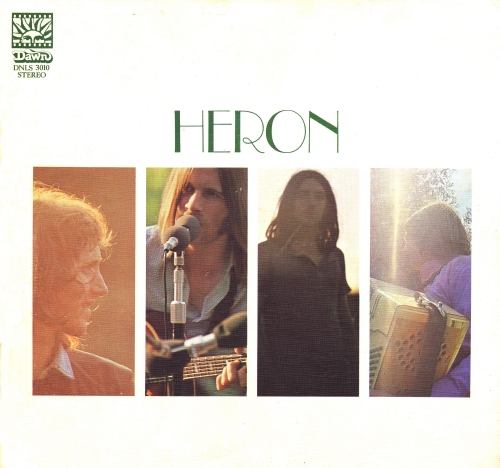

Heron – Heron (1970) 24-bit/96kHz
Folk-Rock | 1970 UK LP | Dawn DNLS 3010
This album is full of beautiful, melancholic songs. The zeitgeist of a better time is contained within its grooves: “There is something running through this album which is strange, almost ethereal. They are the conduit of a greater spirit.”
Formed in Maidenhead, England in 1967, this collective of singers and songwriters are still making music that fans around the world are continuing to discover.
Heron’s sound coalesced on their 1970 self-titled debut, recorded in a field near the band’s rehearsal barn in Appleford, Berkshire. Released on the Dawn label, Pye Records’ ‘progressive’ imprint, the album remains a high water-mark of British folk-rock of the period, with memorable melodies and laid-back harmonies.
Gerald Moore: We had done the recording session at Pye first. And then I sold Peter [Eden] on going down to Appleford, and then [Peter] had to sell the idea to [the record label]. Peter had been booking me in for sessions, and he had all kinds of things going on. He basically said to me, “Let’s do a session.” And I said, “I don’t want to do my own thing anymore. I want to play with Heron.” And he came down to see us at the barn. He said, “I’d rather do your thing, they’re too folky.” And I said, “Well, they’re my mates.” And he said, “Well, all right.” But Pye really liked it.
Daniel Coston: The legend is that Heron had a bad experience in the studio, and that led you to recording in the field.
Tony Pook: We didn’t have a bad experience. We just didn’t like it. The place had no windows, it was underground. [Pye Studios, Marble Arch]
Roy Apps: I certainly wasn’t happy recording in the studio. I hated it.
Coston: Who came up with the idea of recording in a field?
Stephen Jones: We all think it was us.
Moore: I think it was my idea. I said, why don’t we bring the Dawn people down to Appleford. We didn’t say, “Why don’t we do it in a field?” straight away. We said, “Why don’t we bring them to the farm, because Traffic had something at their place. And then when they came down, I think Tony said, “Let’s do it by the river?” Originally, they were going to come down to the farm. Peter came down first, and by the time Peter got to Pye, it was in the field. So it probably was everyone, and Peter.
Pook: I think it was everyone’s idea. We liked being at the barn, and it was only a short walk to the field. You read stuff, and some people think it was a contrived thing. But we were living out there, and it made sense to record out there.
Coston: Were there any problems in recording outside?
Apps: We just accepted the trains. We would have had problems if the weather had been rubbish, but it was gorgeous weather.
Jones: We wanted the [sound of] birds, but we couldn’t actually record them. We had to stick a mic out some distance to get the birds.
Extract from Heron: Upon Reflection. Introduction and interview by Daniel Coston, January 2012. http://danielcoston.blogspot.co.uk/2012/01/heron-interview.html
Track listing:
01. Yellow Roses
02. Car Crash
03. Harlequin 2
04. Smiling Ladies
05. Little Boy
06. Sally Goodin
07. Upon Reflection
08. Lord & Master
09. Little Angel
10. Goodbye
11. For You
12. Sally Goodin
13. Carnival & Penitence
Personnel:
Roy Apps – Guitar, Piano, Vocals
Tony Pook – Vocals
Gerald T. Moore – Guitar, Mandolin, Harmonica, Piano, Vocals
Stephen Jones – Piano, Organ, Electric Piano, Accordion, Vocals
Recorded by the Pye Mobile Recording Unit at Manor Farm, Appleford, Berkshire.
Produced by Peter Eden
Technicals:
Knosti RCM.
Michell GyroDec full version.
Funk Firm FXR II Tonearm.
Audio Technica AT33PTG/II MC Cartridge.
Harman Kardon HK990 Integrated Amplifier.
Gold Interconnects. E-MU 0204 Audio Interface.
Recording, split and manual de-click with Adobe Audition 3.0.1
Click Repair 3.8.3. Vinyl transfer by son-of-albion, October 2012